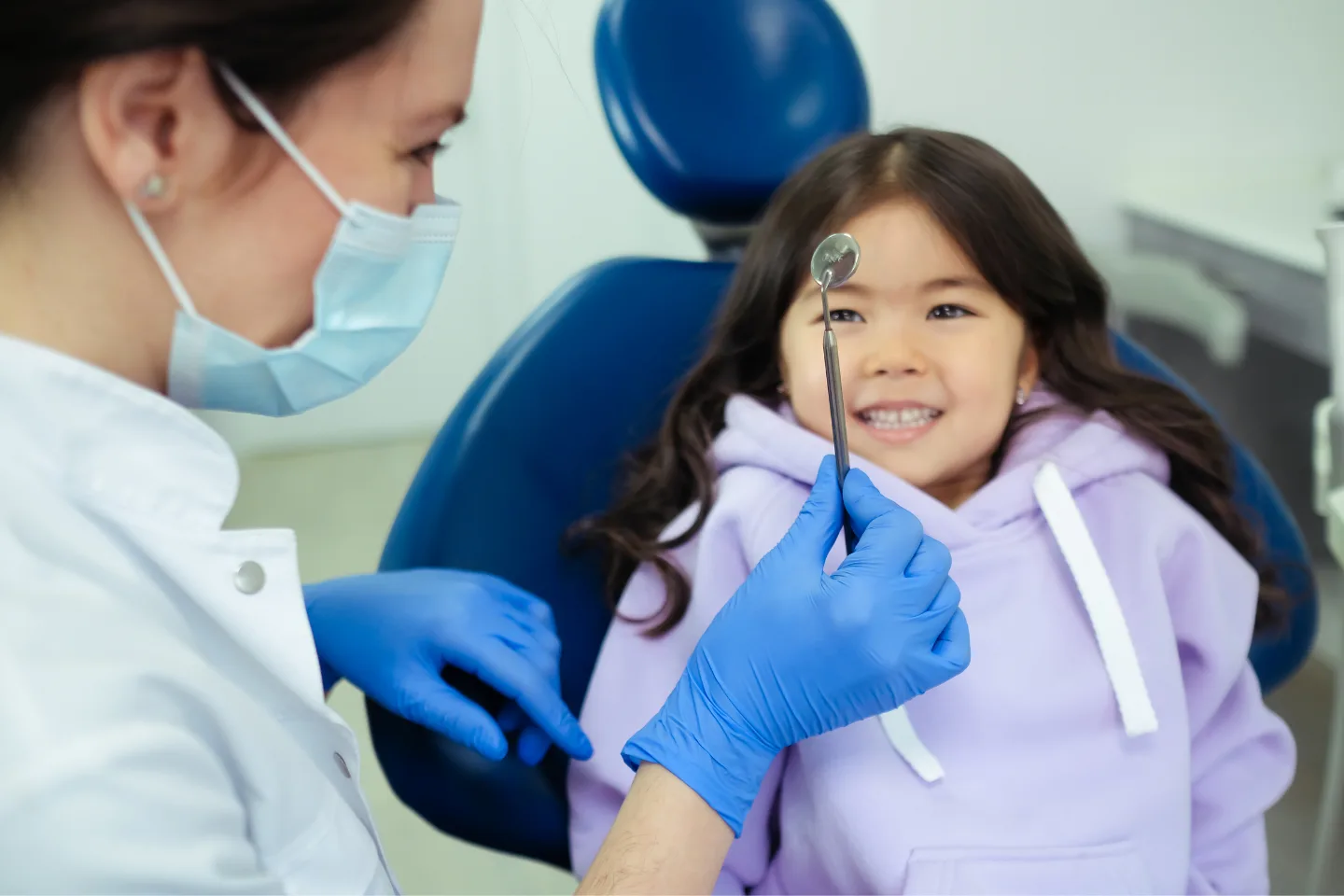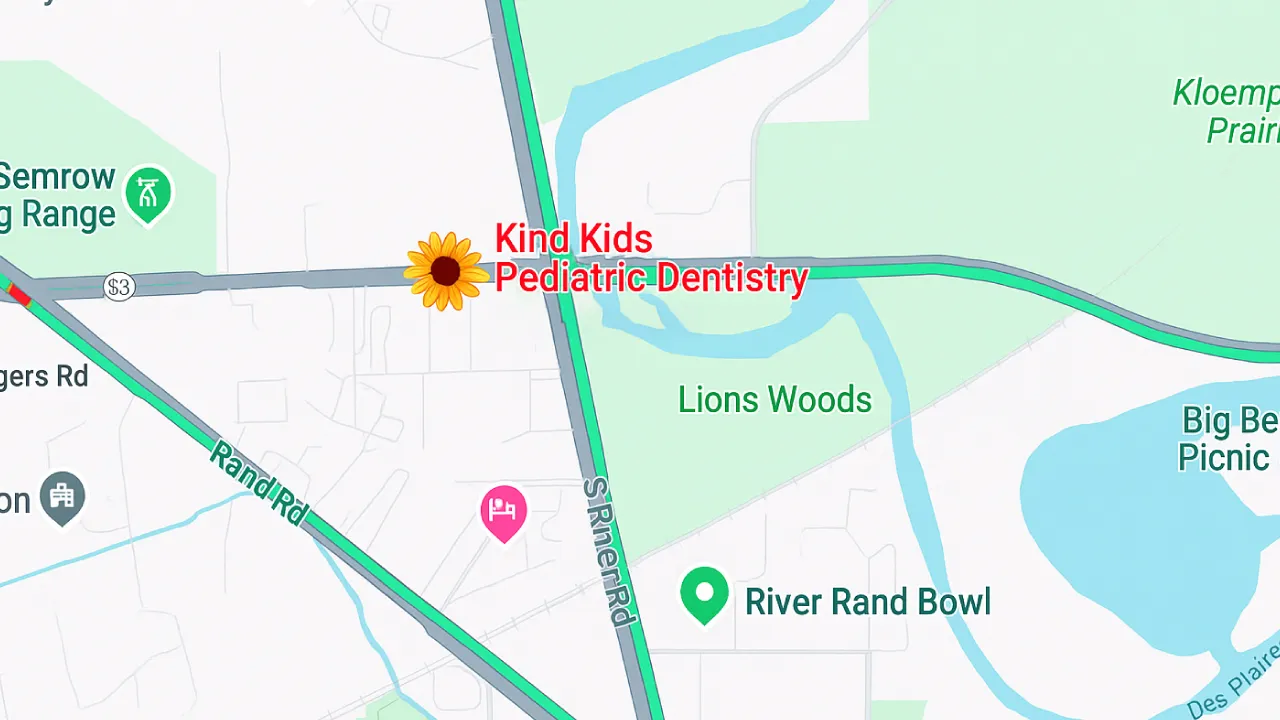
Parents often wonder when the right time is to start thinking about braces or orthodontic care for their child. At Kind Kids Pediatric Dentistry, we believe that early awareness and preventive care play a key role in helping children develop healthy, confident smiles. One important concept that helps guide early orthodontic evaluations is known as the Rule of 7 in pediatric dentistry.
This guideline is a simple and effective way to determine the best time for orthodontic screenings for kids. It helps ensure that any dental or jaw alignment issues are detected and addressed early, preventing more complex problems later in life. In this article, we will explore what the Rule of 7 means, why it matters, and how your pediatric dentist in Des Plaines, IL, can help your child benefit from it.
The Rule of 7 is an important guideline used by pediatric dentists and orthodontists. It suggests that by age 7, children should have their first orthodontic evaluation.
By this age, a mix of baby teeth and permanent teeth is present in the mouth. This combination allows a pediatric dentist or orthodontist to evaluate the way teeth are growing, how the jaws are developing, and whether the bite (how the teeth come together) is functioning properly.
At Kind Kids Pediatric Dentistry, we use this period to look for early signs of:
Even though a child may not need braces at age 7, an early assessment helps the dentist plan the right course of care and monitor the child’s dental growth over time. Regular orthodontic screenings ensure these changes are tracked properly and addressed at the right stage.
The age of 7 is considered ideal because it’s a time of transition in a child’s mouth. Most children at this age have a combination of primary (baby) and permanent teeth, typically including the first molars and front teeth. This mixed dentition stage allows the pediatric dentist to observe:
This age also provides a window of opportunity to guide growth and prevent future orthodontic issues. For example, if the dentist notices that the upper jaw is too narrow, gentle corrective measures can be started early, while the jaw is still growing and flexible. Preventive measures like space maintainers may also be recommended if baby teeth are lost too early.
The Rule of 7 is not just about timing—it’s about prevention and early intervention. Here are some key benefits of early orthodontic screenings:
1. Detecting Problems Early
Many dental or jaw issues are not visible to the untrained eye. Through diagnostic tools like X-rays and bite evaluations, a pediatric dentist can detect hidden issues before they become serious.
2. Guiding Jaw Growth
Early orthodontic guidance can help direct jaw development, ensuring that the upper and lower jaws grow in harmony. This can reduce the need for more invasive orthodontic treatment later.
3. Creating Space for Permanent Teeth
Sometimes, baby teeth fall out too early or too late, affecting how permanent teeth erupt. Early screening allows the dentist to maintain or create proper space for incoming teeth.
4. Reducing the Risk of Tooth Extraction
When orthodontic issues are addressed early, it may eliminate or minimize the need for removing permanent teeth in the future.
5. Improving Oral Habits
Habits such as thumb-sucking, pacifier use, or mouth breathing can affect tooth alignment and jaw growth. A pediatric dentist in Des Plaines, IL, can guide families in gently correcting these habits before they cause long-term effects.
At Kind Kids Pediatric Dentistry, we make sure that every visit is comfortable and informative for both children and parents. During an orthodontic screening, you can expect:
If no immediate treatment is needed, we simply continue to monitor your child’s dental growth with regular checkups. This way, any changes can be caught early, ensuring that your child’s smile develops naturally and beautifully. These checkups often include comprehensive dental exams to ensure all aspects of oral health are evaluated.
When a pediatric dentist identifies early orthodontic issues, interceptive orthodontics may be recommended. This type of treatment focuses on addressing problems while a child’s jaws and teeth are still developing. Examples include:
Interceptive orthodontics can make later treatments shorter and simpler, sometimes preventing the need for full braces altogether. Early intervention is often paired with fluoride treatment to strengthen enamel and support overall dental health.
Parents play a key role in following the Rule of 7 and maintaining good oral health. Here are some tips:
At Kind Kids Pediatric Dentistry, we partner with parents to create a positive dental experience for children, helping them build lifelong healthy habits. To make ongoing dental care simple and affordable, families can also explore our dental membership plan, which supports regular preventive visits and treatments.
Our team at Kind Kids Pediatric Dentistry understands how important early dental care is for growing smiles. We focus on gentle, preventive, and educational care that keeps children comfortable and confident.
Whether your child needs a routine cleaning, an orthodontic screening, or guidance on oral habits, our experienced pediatric dentist in Des Plaines, IL, is here to help. We make dental visits fun and encouraging, helping every child look forward to their next appointment.
1. What is the Rule of 7 in pediatric dentistry?
The Rule of 7 suggests that children should have their first orthodontic evaluation by age 7. This allows a pediatric dentist to assess tooth development, bite alignment, and jaw growth early.
2. Does every child need braces after their age 7 checkup?
No. Most children do not need braces at age 7. The purpose of the screening is to identify potential issues early so they can be monitored or treated if necessary.
3. What are the signs that my child may need early orthodontic care?
Some signs include crowded teeth, early or late loss of baby teeth, difficulty biting or chewing, or noticeable jaw misalignment.
4. How is an orthodontic screening different from a regular dental checkup?
While regular checkups focus on cleaning and preventing cavities, orthodontic screenings focus on the position of teeth, jaw growth, and bite function.
5. Is the screening uncomfortable for children?
Not at all. At Kind Kids Pediatric Dentistry, orthodontic screenings are quick, gentle, and designed to make children feel at ease.
6. What happens if my child misses their age 7 orthodontic screening?
It’s never too late to schedule one. Even if your child is older, an orthodontic evaluation can still provide valuable insights for planning future dental care.
7. How can early screenings save time and money later?
By detecting and managing orthodontic issues early, you can avoid more complex treatments in the future, saving both time and cost.
The Rule of 7 serves as a helpful reminder for parents to schedule an early orthodontic evaluation for their children. By age 7, a child’s dental development provides important clues about future alignment and bite patterns.
At Kind Kids Pediatric Dentistry, we believe that every child deserves a healthy, happy smile—and early care is the first step toward that goal. If you’re looking for a friendly and experienced pediatric dentist in Des Plaines, IL, contact Kind Kids Pediatric Dentistry today to schedule your child’s orthodontic screening. Together, we can make sure your little one’s smile grows bright and strong for years to come.
Get top-quality dental care in Des Plaines, IL—book an appointment
with our experienced dentists at Kind Kids Pediatric Dentistry.
